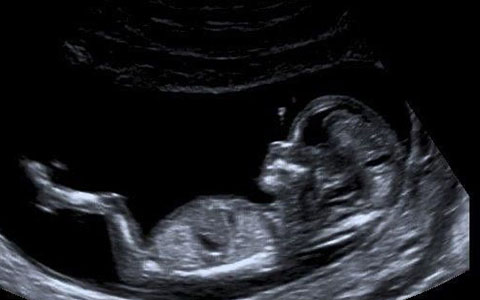
An ultrasound scan uses high-frequency sound waves to make an image of a person's internal body structures.
Doctors commonly use ultrasound to study a developing fetus (unborn baby), a person's abdominal and pelvic organs, muscles and tendons, or their heart and blood vessels.
It plays a big role in accessing viability of different kinds of organ transplant by examining vascular flow.
Preparation for Ultrasound exam
Abdominal ultrasound
If your exam takes place in the morning
- Do not eat any solid or liquid food after midnight. However, you can take your medicine with a little water.
- Do not chew gum, as this will make you swallow air, which may affect the quality of the images.
If your exam takes place after 1 p.m.
- You should be fasting for four to six hours before the exam. However, you can take your medicine with a little water.
- Do not eat fatty food in the morning (muffins, eggs, cheese, sausage, bacon, butters made of peanuts or nuts, butter or margarine). For example, you can eat a serving of oatmeal with fruit, bread with jam, or any other equivalent food if you have gluten intolerance.
- Do not chew gum, as this will make you swallow air, which may affect the quality of the images.
- You can take your medication, but with as little water as possible.
Pelvic & OB ultrasound
- You must have a full bladder when you arrive at the clinic.
- Make sure you drink four eight-ounce glasses (960 ml total) of water or juice 75 minutes before the exam and don’t urinate.
-
Abdominal and pelvic ultrasound
If your exam takes place in the morning
- Do not eat any solid or liquid food after midnight. However, you can take your medicine with a little water.
- You must have a full bladder when you arrive at the clinic. Make sure you drink four eight-ounce glasses (960 ml total) of water or juice 75 minutes before the exam and don’t urinate.
- Do not chew gum, as this will make you swallow air, which may affect the quality of the images.
If your exam takes place after 1 p.m.
- You should be fasting for four to six hours before the exam. However, you can take your medicine with a little water.
- You must have a full bladder when you arrive at the clinic. Make sure you drink four eight-ounce glasses (960 ml total) of water or juice 75 minutes before the exam and don’t urinate.
- Do not eat fatty food in the morning (muffins, eggs, cheese, sausage, bacon, butters made of peanuts or nuts, butter or margarine). For example, you can eat a portion of oatmeal with fruit, bread with jam, or any other equivalent food if you have gluten intolerance.
- Do not chew gum, as this will make you swallow air, which may affect the quality of the images
Thyroid, Musculoskeletal & Testicular ultrasound
No preparation is required before these ultrasounds. However, it is recommended to avoid the use of creams or perfumes before the examination.

